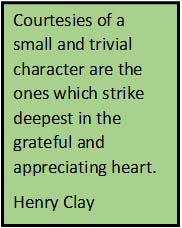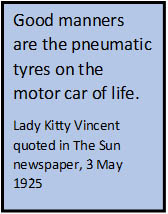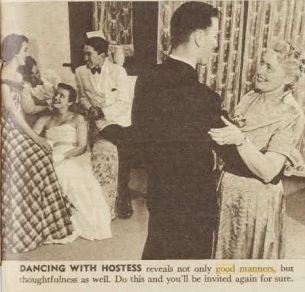
It’s traditional for the older generation to bemoan “things aren’t how they used to be”. Well of course not…life is one long process of change. For no particular reason I’ve been reflecting on some of the little courtesies that were prevalent in my youth, some of which have faded from sight, and some still remain, perhaps in a changed form.
- Men walking on the road side of the footpath (pavement). As I recall the intention was they would deflect the dangers of a runaway car, or earlier, a horse and cart.
- Children standing up for adults on public transport. This one definitely seems to have gone the way of the horse and cart. Small children might have been bundled on to their parent’s lap, but older children were always, always expected to stand if an adult needed a seat. Similarly, men would stand for women, and anyone would stand for a pregnant woman, older man or woman, or someone who had a disability.
- Men opening the car door for women. I still see this happening – but not in our family. As my husband quite rightly points out, he’d have Buckley’s chance of getting there before I’m out <smile>. However, there are some of our friends for whom this remains de rigeur.
- Men raising their hats and people standing silent when a funeral passes. This too has passed except in country areas where I think it does continue.

- Men doffed their hats when meeting a woman. Now men rarely wear hats.
- Women not shaking hands. Men were definitely not to offer their hands for a handshake to a woman without first being offered theirs. This has changed with the presence of women in the workforce, though for many years men were left with the confusing question – to shake or not to shake. For men of course the handshake is compulsory – and for some the stronger the better. Personally I don’t like a wishy-washy handshake, but I don’t like it being a test of power or strength either.
- Women wearing gloves and hats. Not really a courtesy but a lady would never be seen out in the public domain without her gloves and a hat – and wearing stockings.
- Women were never to be congratulated on getting engaged as it implied they were lucky to have finally achieved this transition to marital status.
- Never discuss religion or politics. Perhaps we’d have been wiser to maintain this courtesy these days…fewer “debates”.

- Men never swore in front of ladies, and ladies, of course, never swore. In my family that was certainly true. As for myself these days…”no comment”.
- Children were everyone’s responsibility – a badly behaved child would be reprimanded by whichever adult was close by. Of course children were often expected to be seen and not heard too.
- Writing letters to friends and family to thank them for gifts.
- All adult friends of the family were called “aunty” or “uncle” irrespective of kinship. Otherwise they were Mr or Mrs or Miss. Does your family still do this?
- Men opening doors for women. I notice this still happens often. My personal habit is to always thank them for the courtesy, rather than just sail through. One of my pet bugbears is opening, or holding open, a door for people who just walk through without a sideways glance as if you’re a paid doorman.
- Women were allowed on the bus/tram first. And look where that got the men on the Titanic!
- Thanking the bus driver when you got off. I’m pleased to say that this still happens most of the time on public transport in Brisbane.
I’m sure my genimates will come up with some other old-time courtesies that I’ve forgotten…I’d love to hear from you.
Do you think courtesy still matters and is practiced in the 21st century?
Are good manners the same thing as courtesy? What do you think?
Great post! 🙂 I was born in the 80s so some of these are new to me but, my parents raised me with a few of them. I always stood on the train for other adults and today bemoan the students who don’t do the same. I too called my Mum and Dad’s friends Uncle or Aunty even if they weren’t related. At work, I often encounter men who wait in the lift for women to exit first. And, I always say thank you. 🙂
LikeLiked by 1 person
Thanks for visiting Jess. Many of our habits start with family training don’t they?
LikeLiked by 2 people
The only one we didn’t follow was not congratulating women on engagements… we congratulated everyone. As for writing Thank You letters, I always did… now I tend to phone or email. however, I rarely get Thank Yous from some of the younger generation, even when I’m there. Grandkids always do. I could wait till hell freezes over before getting a thank you for anything from one lot…
LikeLike
My husband always walks on the road side of the pavement, but then we were both born in the 1940s so I suppose it is ingrained in him.
I remember being surprise while on holiday in Australia six or so years ago, having got on a tram I was mystified when a young man stood and offered me his seat. It was a lovely thing to do, and I gratefully accepted but it made me feel very old! It got me thinking how that doesn’t happen in the UK any more (well not to me).
We were taught to give up our seats, hold doors open, and say please and thank you, I wish it were still so.
Lovely post, thank you for the memories.
LikeLiked by 1 person
I’m pleased Australia gave you a surprising example of good manners…that was a well brought up young man.
LikeLike
Because I am so bumble-footed sometimes I accidentally tread on the toes of young sittees on public transport.
LikeLiked by 2 people
Accidentally on purpose?
LikeLike
Never, a lady wouldn’t do such a thing.
LikeLiked by 1 person
A please and thank you would not go amiss when being served at shops and restaurants. After all we are handing over our $$$$$. As for standing on public transport I could just about guarantee a 60 year old female would stand for a pregnant lady before most others. I put my hand out promptly when I want to shake hands. Makes it easier for the man to know where he stands. I hate people that stop and talk right in the middle of doors or at the top and bottom of escalators. Often my luggage crashes right into them. Of course I say sorry. But what I am really sorry about is that they are so silly to be standing there and not bright enough to see what they are doing. Better get off my soap box. Great piece.
LikeLiked by 1 person
Good soap-boxing Fran 🙂 I’m with you on most of those though I suspect we all have dozy moments sometimes where we stop in our tracks in other people’s way. I felt much the same today when two people my age dithered for five minutes over what to order as take-away while the till was kept open and the queue lengthened for a “quick” coffee.
LikeLike
I love this post, Cass! I think another reason for the man to walk next to the pavement was also to save women from the splash of mud from carriages and later cars when they ran through puddles. My Mum drilled thanking the bus driver into me and I do the same to my son. Also if cars stop for us at the crossing, we give a little wave and nod of thanks. I also make him do thank you cards for his birthday presents! I love the “Women were never to be congratulated on getting engaged”. I hadn’t heard of that one before. I certainly wish most of those courtesies still exist as normal everyday behaviour today. A little bit of courtesy keeps us all civilised! 🙂
LikeLiked by 1 person
I think you’re well on the way to teaching your son a lot of these little courtesies to others. You’re right about the splashing …I hadn’t thought of that, and hadn’t thought about the little crossing wave or nod. We often have a coffee near a waterfront pedestrian crossing and have noticed that most people do the wave…rather like if someone lets you into a traffic jam and they don’t have to. It all comes down to kindness doesn’t it?
LikeLiked by 2 people
I realised people thought I was old when they stood up for me on a Brisbane City Council bus. How embarrassing. However it is polite not to say no which is my first thought.
LikeLike
Me too 🙂 I blame my grey hair:) as you say it’s their courtesy that’s important.
LikeLike
I was raised with and still practise many of these. And my husband still walks on the outside 😊
LikeLiked by 1 person
I wonder how long these courtesies will last in the future.
LikeLike
I recognize all of these except thanking the bus driver as we got off. Often the exit door was in the back/middle of the bus, I don’t remember anyone thanking him as we got off. I do appreciate all manner of politiness and wish they were not disappearing.
LikeLiked by 1 person
It’s true that the door towards the back has affected our practice here also. The little courtesies make a difference to daily life don’t they?
LikeLike